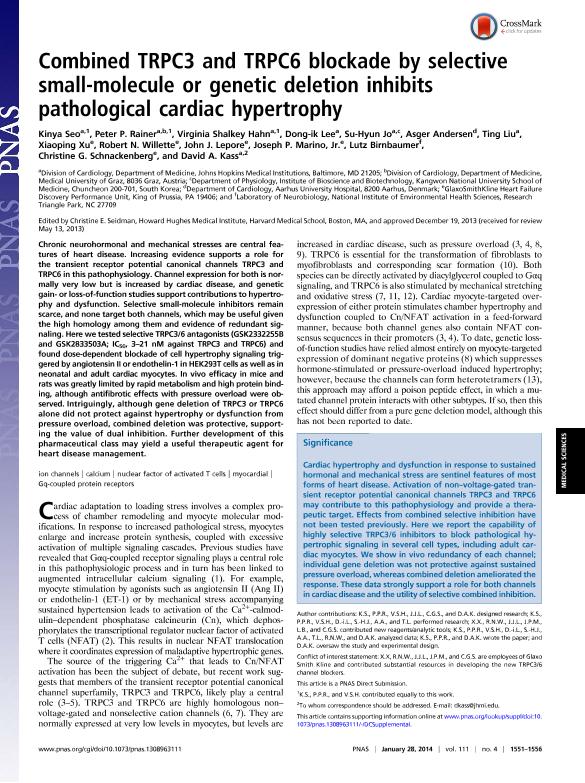Artículo
Combined TRPC3 and TRPC6 blockade by selective small-molecule or genetic deletion inhibits pathological cardiac hypertrophy
Seo, Kinya; Rainer, Peter P.; Shalkey Hahn, Virginia; Lee, Dong-ik; Jo, Su-Hyun; Andersen, Asger; Liu, Ting; Xu, Xiaoping; Willette, Robert N.; Lepore, John J.; Marino, Joseph P.; Birnbaumer, Lutz ; Schnackenberg, Christine G.; Kass, David A.
; Schnackenberg, Christine G.; Kass, David A.
 ; Schnackenberg, Christine G.; Kass, David A.
; Schnackenberg, Christine G.; Kass, David A.
Fecha de publicación:
28/01/2014
Editorial:
National Academy of Sciences
Revista:
Proceedings of the National Academy of Sciences of The United States of America
ISSN:
0027-8424
e-ISSN:
1091-6490
Idioma:
Inglés
Tipo de recurso:
Artículo publicado
Clasificación temática:
Resumen
Chronic neurohormonal and mechanical stresses are central fea-tures of heart disease. Increasing evidence supports a role forthe transient receptor potential canonical channels TRPC3 andTRPC6 in this pathophysiology. Channel expression for both is nor-mally very low but is increased by cardiac disease, and geneticgain- or loss-of-function studies support contributions to hypertro-phy and dysfunction. Selective small-molecule inhibitors remainscarce, and none target both channels, which may be useful giventhe high homology among them and evidence of redundant sig-naling. Here we tested selective TRPC3/6 antagonists (GSK2332255Band GSK2833503A; IC50,3–21 nM against TRPC3 and TRPC6) andfound dose-dependent blockade of cell hypertrophy signaling trig-gered by angiotensin II or endothelin-1 in HEK293T cells as well as inneonatal and adult cardiac myocytes. In vivo efficacy in mice andrats was greatly limited by rapid metabolism and high protein bind-ing, although antifibrotic effects with pressure overload were ob-served. Intriguingly, although gene deletion of TRPC3 or TRPC6alone did not protect against hypertrophy or dysfunction frompressure overload, combined deletion was protective, support-ing the value of dual inhibition. Further development of thispharmaceutical class may yield a useful therapeutic agent forheart disease management.
Palabras clave:
ION CHANNELS
,
CALCIUM
,
NUCLEAR FACTOR OF ACTIVATED
,
T CELLS
Archivos asociados
Licencia
Identificadores
Colecciones
Articulos(IIB-INTECH)
Articulos de INST.DE INVEST.BIOTECNOLOGICAS - INSTITUTO TECNOLOGICO CHASCOMUS
Articulos de INST.DE INVEST.BIOTECNOLOGICAS - INSTITUTO TECNOLOGICO CHASCOMUS
Citación
Seo, Kinya; Rainer, Peter P.; Shalkey Hahn, Virginia; Lee, Dong-ik; Jo, Su-Hyun; et al.; Combined TRPC3 and TRPC6 blockade by selective small-molecule or genetic deletion inhibits pathological cardiac hypertrophy; National Academy of Sciences; Proceedings of the National Academy of Sciences of The United States of America; 111; 4; 28-1-2014; 1551-1556
Compartir
Altmétricas



